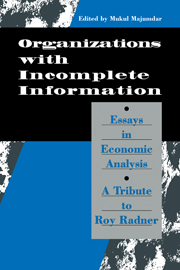Book contents
- Frontmatter
- Contents
- List of Contributors
- Preface
- Introduction: Searching for Paradigms
- 1 Equilibrium with Incomplete Markets in a Sequence Economy
- 2 The Existence of Rational Expectations Equilibrium: A Retrospective
- 3 Rational Expectations and Rational Learning
- 4 Dynamic Games in Organization Theory
- 5 The Equilibrium Existence Problem in General Markovian Games
- 6 A Practical Person's Guide to Mechanism Selection: Some Lessons from Experimental Economics
- 7 Organizations with an Endogenous Number of Information Processing Agents
- 8 A Modular Network Model of Bounded Rationality
- Index
Preface
Published online by Cambridge University Press: 09 October 2009
- Frontmatter
- Contents
- List of Contributors
- Preface
- Introduction: Searching for Paradigms
- 1 Equilibrium with Incomplete Markets in a Sequence Economy
- 2 The Existence of Rational Expectations Equilibrium: A Retrospective
- 3 Rational Expectations and Rational Learning
- 4 Dynamic Games in Organization Theory
- 5 The Equilibrium Existence Problem in General Markovian Games
- 6 A Practical Person's Guide to Mechanism Selection: Some Lessons from Experimental Economics
- 7 Organizations with an Endogenous Number of Information Processing Agents
- 8 A Modular Network Model of Bounded Rationality
- Index
Summary
This collection of essays grew out of a conference that I organized at Cornell University in June 1992 to honor Professor Roy Radner on his sixty-fifth birthday: it is a pleasure to note that some of the distinguished alumni of Cornell (Professors Beth Allen, Prajit Dutta, James Jordan, Andrew Schotter, Raghu Sundaram) were able to contribute to this volume. Generous financial support from the Center for Applied Mathematics, the Center for Analytic Economics, and the Department of Economics is gratefully acknowledged. In this context, I am particularly grateful to David Easley, Don Randel, John Guckenheimer, Karl Shell, and Tapan Mitra for their encouragement. The success of the conference owed much to the organizational skills of Ann Stiles.
I would like to thank Professors C. D. Aliprantis, A. Banerjee, J. Benhabib, J. Boyd, M. Datta, M. El-Gamal, R. Ericson, L. Fernandez, J. K. Ghosh, T. Groves, L. Hurwicz, M. Ali Khan, P. Linhart, E. Malinvaud, E. Maskin, C. B. McGuire, L. McKenzie, M. Meurer, L. Miller, K. Nishimura, Y. Nyarko, A. Radunskaya, R. Rosenthal, M. Rothschild, A. Rubinstein, G. Sorger, S. Williams, K. Yun, and E. Zajac for their help and advice at various stages of the project.
This volume does not adequately reflect Roy Radner's impressive range of interests and contributions, and it is not meant to be a Festschrift. Productive as ever, Roy is keenly exploring new areas and searching for new paradigms. But time and again, he has returned to topics involving decisions and organizations with incomplete information, and we feel that a set of essays on these themes is a fitting tribute to his creativity.
- Type
- Chapter
- Information
- Organization with Incomplete InformationEssays in Economic Analysis: A Tribute to Roy Radner, pp. ix - xPublisher: Cambridge University PressPrint publication year: 1998

